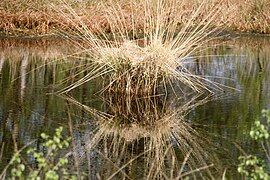| Ewiges Meer | |
|---|---|
 The Ewiges Meer, Oct 1987 The Ewiges Meer, Oct 1987 | |
 | |
| Location | East Frisia, Lower Saxony |
| Coordinates | 53°32′44″N 7°25′54″E / 53.54556°N 7.43167°E / 53.54556; 7.43167 |
| Max. length | 1.650 km (1.025 mi) |
| Max. width | 0.870 km (0.541 mi) |
| Surface area | 91 ha (220 acres) |
| Average depth | 2 m (6 ft 7 in) |
| Max. depth | 3 m (9.8 ft) |
| Water volume | ca. 2,000,000 m (1,600 acre⋅ft) |
| Surface elevation | 8.5 m (28 ft) |
The Ewiges Meer is the largest raised bog lake in Germany, with an area of 91 hectares (0.91 km). Its surface lies at about 8.5 metres above sea level (NN). The lake is surrounded by an extensive complex of unutilised areas, that exhibit the actual raised bog profile and, together with the lake, form the Ewiges Meer Nature Reserve (Ewiges Meer und Umgebung) which covers an area of 1,290 hectares.
Location
The nature reserve lies on the border of the counties of Wittmund and Aurich near the village of Eversmeer in East Frisia. It belongs to the Nenndorf Raised Bog (Nenndorfer Hochmoor) on the shoulder of the Oldenburg-East Frisian Geest Ridge and forms the core zone of the roughly 33-square kilometre Großes Moor bog complex near Aurich.
-
Shoreline of the Ewiges Meer
-
 The Dobbe, a nearby bog eye
The Dobbe, a nearby bog eye
-
 Purple moor-grass tussock
Purple moor-grass tussock
-
 Ground fog at Ewiges Meer
Ground fog at Ewiges Meer
See also
References
- "Steckbrief Naturschutzgebiet "Ewiges Meer, Großes Moor bei Aurich" | Nds. Landesbetrieb für Wasserwirtschaft, Küsten- und Naturschutz". Retrieved 2021-02-12.
Literature
- Harm Poppen: Naturschutzgebiet Ewiges Meer. Verlag Cl. Mettcker & Söhne, Esens, 1991, ISBN 3-87542-009-8.
- Ernst Andreas Friedrich: Naturdenkmale Niedersachsens. Landbuch-Verlag, Hanover, 1980, ISBN 3-7842-0227-6.
External links
- Website about the Ewiges Meer Nature Reserve Archived 2019-04-02 at the Wayback Machine
- Ewiges Meer Nature Reserve in the database of the Lower Saxon State Agency for Water Management, Coastal and Nature Protection (Niedersächsischer Landesbetrieb für Wasserwirtschaft, Küsten- und Naturschutz) or NLWKN
- Documentation on the condition and development of the most important lakes in Germany by TU Cottbus, Teil 4: Bremen und Niedersachsen (pdf, 500 kb)